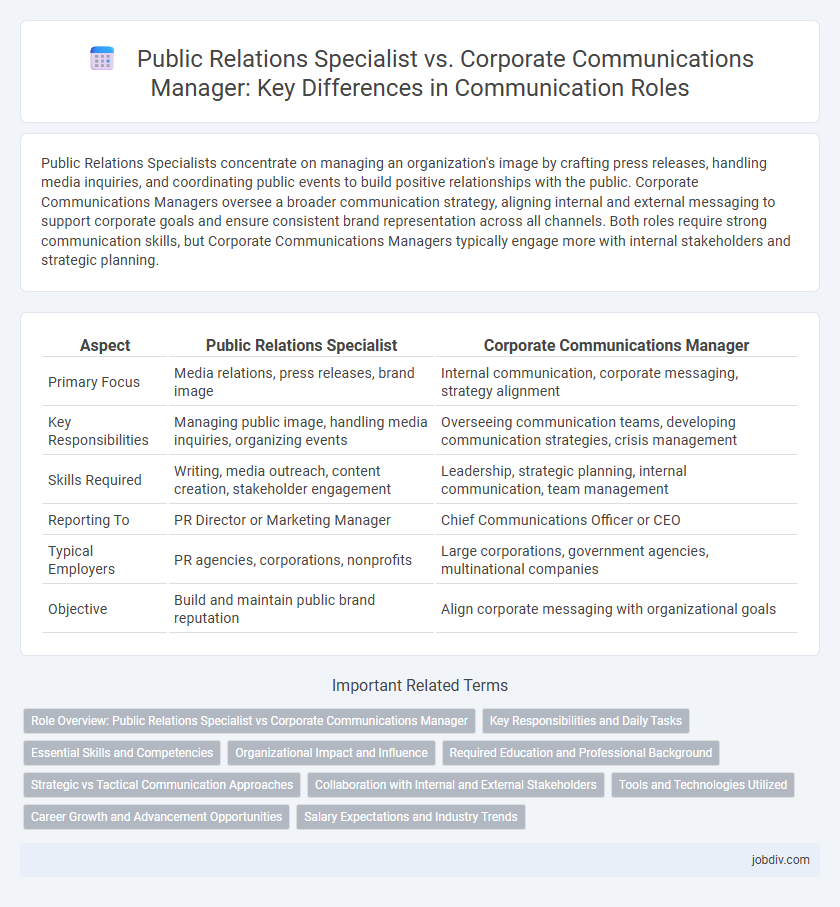Public Relations Specialists concentrate on managing an organization's image by crafting press releases, handling media inquiries, and coordinating public events to build positive relationships with the public. Corporate Communications Managers oversee a broader communication strategy, aligning internal and external messaging to support corporate goals and ensure consistent brand representation across all channels. Both roles require strong communication skills, but Corporate Communications Managers typically engage more with internal stakeholders and strategic planning.
Table of Comparison
| Aspect | Public Relations Specialist | Corporate Communications Manager |
|---|---|---|
| Primary Focus | Media relations, press releases, brand image | Internal communication, corporate messaging, strategy alignment |
| Key Responsibilities | Managing public image, handling media inquiries, organizing events | Overseeing communication teams, developing communication strategies, crisis management |
| Skills Required | Writing, media outreach, content creation, stakeholder engagement | Leadership, strategic planning, internal communication, team management |
| Reporting To | PR Director or Marketing Manager | Chief Communications Officer or CEO |
| Typical Employers | PR agencies, corporations, nonprofits | Large corporations, government agencies, multinational companies |
| Objective | Build and maintain public brand reputation | Align corporate messaging with organizational goals |
Role Overview: Public Relations Specialist vs Corporate Communications Manager
A Public Relations Specialist manages media relations, crafts press releases, and monitors public perception to enhance brand reputation, while a Corporate Communications Manager oversees internal and external communication strategies to align messaging across departments and stakeholders. Public Relations Specialists focus primarily on external audiences and media engagement, whereas Corporate Communications Managers integrate corporate goals with communication objectives to support organizational culture and business initiatives. Both roles require strong storytelling skills and strategic planning, but the Corporate Communications Manager holds broader responsibility for comprehensive communication frameworks.
Key Responsibilities and Daily Tasks
Public Relations Specialists manage media relations, craft press releases, and coordinate publicity campaigns to enhance brand reputation. Corporate Communications Managers oversee internal and external communications strategies, ensuring consistent messaging across channels and aligning communication efforts with organizational goals. Both roles require strong writing skills and media knowledge, but Corporate Communications Managers typically handle broader strategic planning and employee engagement initiatives.
Essential Skills and Competencies
Public Relations Specialists excel in media relations, content creation, and crisis communication, requiring strong storytelling and interpersonal skills to manage brand reputation. Corporate Communications Managers possess strategic planning, internal communications, and leadership abilities, crucial for aligning messaging across diverse stakeholders and driving organizational objectives. Both roles demand adaptability, digital literacy, and a deep understanding of audience engagement to effectively shape public perception.
Organizational Impact and Influence
Public Relations Specialists primarily manage external communications, enhancing brand reputation by crafting press releases, media pitches, and managing crisis communications to influence public perception. Corporate Communications Managers oversee both internal and external messaging, aligning communication strategies with organizational goals to ensure consistent brand voice and employee engagement across all channels. Their broader scope enables greater influence on corporate culture and stakeholder relationships, directly impacting organizational effectiveness and reputation management.
Required Education and Professional Background
Public Relations Specialists typically hold a bachelor's degree in communications, journalism, or public relations, with experience in media relations and content creation. Corporate Communications Managers often require advanced degrees such as a master's in business administration or corporate communications, paired with extensive experience in strategic planning and internal communications. Both roles demand strong writing skills and proficiency in digital communication tools, but managers usually have broader leadership responsibilities within corporate settings.
Strategic vs Tactical Communication Approaches
Public Relations Specialists primarily execute tactical communication strategies, focusing on media relations, press releases, and event coordination to enhance brand visibility. Corporate Communications Managers develop and implement strategic communication plans that align with organizational goals, overseeing internal and external messaging frameworks. The strategic approach of managers ensures cohesive narratives across all platforms, while specialists concentrate on targeted, short-term communication initiatives.
Collaboration with Internal and External Stakeholders
Public Relations Specialists focus on crafting targeted messages and managing media relations to enhance brand reputation, ensuring consistent communication with external audiences such as journalists and customers. Corporate Communications Managers oversee comprehensive communication strategies that integrate both internal employee engagement and external stakeholder collaboration, aligning messaging across departments to support organizational goals. Both roles require strategic coordination and partnership with internal teams and external partners to maintain a unified and effective communication approach.
Tools and Technologies Utilized
Public Relations Specialists primarily utilize media monitoring software, press release distribution platforms, and social media management tools to shape and maintain public image. Corporate Communications Managers leverage advanced internal communication systems, collaboration software such as Slack or Microsoft Teams, and analytics platforms to align messaging across departments and measure engagement impact. Both roles depend on digital communication technologies but differ in focus, with PR Specialists targeting external audiences and Corporate Communications Managers concentrating on internal stakeholder communication.
Career Growth and Advancement Opportunities
Public Relations Specialists typically focus on building media relationships and managing external communications, offering foundational experience that can lead to roles such as Communications Coordinator or Media Relations Manager. Corporate Communications Managers oversee internal and external messaging strategies across multiple channels, providing broader leadership exposure and paving the way to executive positions like Communications Director or Chief Communications Officer. Career growth in corporate communications often involves higher responsibility for organizational reputation and strategic alignment, whereas public relations roles emphasize media engagement and brand awareness.
Salary Expectations and Industry Trends
Public Relations Specialists typically earn an average salary ranging from $50,000 to $70,000 annually, while Corporate Communications Managers command higher compensation, often between $80,000 and $120,000, reflecting their strategic role in organizational messaging. Industry trends indicate a rising demand for Corporate Communications Managers in sectors like technology and finance due to the increasing importance of integrated communication strategies. Skillsets emphasizing digital media proficiency, crisis management, and data-driven communication are critical factors influencing salary growth and career advancement in both roles.
Public Relations Specialist vs Corporate Communications Manager Infographic

 jobdiv.com
jobdiv.com